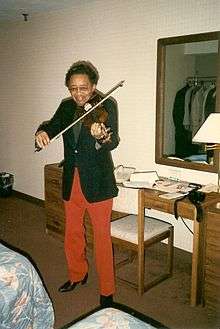Claude Williams (musician)
Claude "Fiddler" Williams (February 22, 1908 – April 26, 2004) was an American jazz violinist and guitarist who recorded and performed into his 90s. He was the first guitarist to record with Count Basie and the first musician to be inducted into the Oklahoma Jazz Hall of Fame.[1]
Claude Williams | |
|---|---|
 | |
| Background information | |
| Born | February 22, 1908 Muskogee, Oklahoma |
| Died | April 26, 2004 (aged 96) Kansas City, Missouri |
| Genres | Jazz |
| Occupation(s) | Musician |
| Instruments | Violin, guitar |
| Years active | 1927–2000 |
| Labels | SteepleChase, Arhoolie, Progressive, Black & Blue |
| Associated acts | Andy Kirk, Jay McShann |
Music career
Claude Gabriel Williams was born in Muskogee, Oklahoma. At the age of 10 he played guitar, mandolin, banjo, and cello. After hearing Joe Venuti on the violin, he decided he wanted to play violin.[2] He went to Kansas City, Missouri, in 1927 and became part of the Twelve Clouds of Joy, led by trumpeter Terrence Holder and then Andy Kirk, with Mary Lou Williams on piano. He recorded with them for Brunswick Records the following year. After leaving Kirk, he played in Chicago in a band with Nat King Cole and his brother Eddie Cole[3] and then became the first guitarist to record with Count Basie.[1]
He spent most of his life in Kansas City. In the 1950s, he played with Eddie Vinson, Hank Jones, and another musician from Muskogee, pianist Jay McShann.[2] For the next twenty years he led his own groups but did not record. Nearly thirty years since his last recording, he reunited with McShann in the 1970s[1] to record McShann's album Man from Muskogee.[3] Williams performed at Bill's Le Gourmet in Wichita, Kansas from 1972-1977.
In the 1990s, Williams performed at Carnegie Hall, Lincoln Center, and at the inauguration of President Bill Clinton. He was profiled on the TV program CBS News Sunday Morning and became the first person to be inducted into the Oklahoma Jazz Hall of Fame.[1] He was a recipient of a 1998 National Heritage Fellowship awarded by the National Endowment for the Arts, which is the highest honor in the folk and traditional arts in the United States.[4] His last album, Swingin' the Blues, was recorded in 2000.[3] He was 96 when he died in 2004.[1]
He was the last surviving jazz musician to have recorded before 1930.[5] His memorabilia was donated to the University of Missouri–Kansas City.[6]
Discography
- Call for the Fiddler (SteepleChase, 1976)
- Kansas City Giants (Big Bear Records, 1980)
- Fiddler's Dream (Classic Jazz), 1981
- Live at J's, Pt. 1 (Arhoolie, 1989)
- Live at J's, Pt. 2 (Arhoolie, 1989)
- Swingtime in New York (Progressive, 1994)
- Jazz Violin & Guitar Duets (Global Village, 1995)
- King of Kansas City (Progressive, 1996)
- Swingin' the Blues (Bullseye Blues, 2000)
- My Silent Love (Black & Blue, 2002)[7]
With Count Basie
- The Original American Decca Recordings (GRP, 1937–39 [1992])
References
- Kelsey, Chris. "Claude "Fiddler" Williams | Biography & History | AllMusic". AllMusic. Retrieved October 11, 2016.
- Murph, John. "NPR's Jazz Profiles: Claude Williams". NPR. Retrieved October 11, 2016.
- Martin, Douglas (April 27, 2004). "Claude (Fiddler) Williams, 96, Jazz Violinist". The New York Times. Retrieved October 11, 2016.
- "NEA National Heritage Fellowships 1998". www.arts.gov. National Endowment for the Arts. Retrieved November 11, 2017.
- "Claude 'Fiddler' Williams: 1908-2004". Jazzhouse.org. Retrieved September 28, 2010.
- "Widow of 'Fiddler' Williams pleased UMKC took such care of his memorabilia". KansasCity.com. April 25, 2004. Retrieved September 28, 2010.
- "Claude "Fiddler" Williams | Album Discography | AllMusic". AllMusic. Retrieved October 11, 2016.